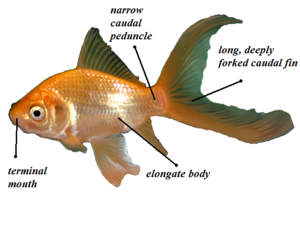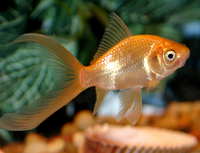Comet (goldfish): Difference between revisions
imported>Drew R. Smith mNo edit summary |
mNo edit summary |
||
| (9 intermediate revisions by 3 users not shown) | |||
| Line 1: | Line 1: | ||
{{Infobox Goldfish | __NOTOC__{{subpages}}{{Infobox Goldfish | ||
| Name = Comet | | Name = Comet | ||
| Image = Cometdiagram. | | Image = Cometdiagram.png | ||
| Image2 = JuvenileComet. | | Image2 = JuvenileComet.png | ||
| Size = Variable | | Size = Variable | ||
| Level = All | | Level = All | ||
| Line 10: | Line 10: | ||
| Origin = USA | | Origin = USA | ||
}} | }} | ||
<center>''This article is about the anatomy and history of the Comet Goldfish and has very little how-to information. <br>For an in depth tutorial, see our [[Comet (goldfish)/Tutorials|guide]]''</center> | |||
The '''comet''' or '''comet-tailed goldfish''' is the most common variety of fancy [[goldfish]] in the United States. It is similar to the [[Common Goldfish]], except slightly smaller and slimmer, and is mainly distinguished by its long deeply forked tail. | |||
==Physical Description== | |||
[[Image:GoldComet.png|left|200px]] | |||
The body shape of all Comets is elongate, with equally curved dorsal and ventral contours. It is not as deep as the [[Common Goldfish]]. The colors of these fish depend on the strain, the most popular of which show red-orange and lemon-yellow colorations. The varieties shown here include an uncolored juvenile Comet, a Gold (or Metallic) Comet, and an extremely popular strain, the Sarasa (or Red Cap) Comet. A distinctive, cultivated feature of these varieties is the deeply forked caudal fin, which can be almost as long as the body. | |||
==History== | |||
The comet goldfish breed was developed in the United States from the [[Common Goldfish]] by Hugo Mulertt, a government worker, in the 1880s. The first comet goldfish was seen in the ponds of the U.S. Government Fish Commission in Washington. Mulertt later became a propagator of goldfish and an author of books on goldfish. He was the first person to place the comet onto the fishkeeping market in quantity. | |||
==In the aquarium== | |||
The Comet Goldfish behaves much like the [[Common Goldfish]], with a few exceptions. While the Common Goldfish usually inhabits the bottom and middle levels of a tank, Comet's inhabit all levels. Also unlike Common Goldfish, Comets are schooling fish, and should be kept in schools of no less than five Comets to a tank. | |||
==Goldfish Farms== | |||
Goldfish are commonly bred on fish farms in many parts of the world. In most instances, the fish produced are offered for sale to aquarists. However, in North America, there is a demand for goldfish used as bait or "feeder fish" to other fish by anglers. Due to the relatively inexpensive prices of comet goldfish, they may also be used as prizes in carnivals or other places of entertainment. The use of goldfish as bait, feeder fish and carnival prizes is controversial, and animal rights activists have attempted to make the practice illegal, albeit unsuccessfully. | |||
==Gallery== | |||
<gallery> | |||
Image:SarasaComet.png|A Sarasa Comet | |||
Image:GoldComet.png|A Gold Comet | |||
Image:Cometdiagram.png|A diagram of a Comet | |||
Image:JuvenileComet.png|A juvenile Comet | |||
</gallery> | |||
{{:Comet (goldfish)/Related Articles}} | |||
{{:Comet (goldfish)/Bibliography}}[[Category:Suggestion Bot Tag]] | |||
Latest revision as of 16:01, 30 July 2024
| Comet | |
|---|---|

| |
| Family | Cyprinidae |
| Size | Variable |
| Tank Level | All |
| Temperament | Peaceful, Schooling |
| Tail Type | Single-tailed |
| Country of Origin | USA |
For an in depth tutorial, see our guide
The comet or comet-tailed goldfish is the most common variety of fancy goldfish in the United States. It is similar to the Common Goldfish, except slightly smaller and slimmer, and is mainly distinguished by its long deeply forked tail.
Physical Description
The body shape of all Comets is elongate, with equally curved dorsal and ventral contours. It is not as deep as the Common Goldfish. The colors of these fish depend on the strain, the most popular of which show red-orange and lemon-yellow colorations. The varieties shown here include an uncolored juvenile Comet, a Gold (or Metallic) Comet, and an extremely popular strain, the Sarasa (or Red Cap) Comet. A distinctive, cultivated feature of these varieties is the deeply forked caudal fin, which can be almost as long as the body.
History
The comet goldfish breed was developed in the United States from the Common Goldfish by Hugo Mulertt, a government worker, in the 1880s. The first comet goldfish was seen in the ponds of the U.S. Government Fish Commission in Washington. Mulertt later became a propagator of goldfish and an author of books on goldfish. He was the first person to place the comet onto the fishkeeping market in quantity.
In the aquarium
The Comet Goldfish behaves much like the Common Goldfish, with a few exceptions. While the Common Goldfish usually inhabits the bottom and middle levels of a tank, Comet's inhabit all levels. Also unlike Common Goldfish, Comets are schooling fish, and should be kept in schools of no less than five Comets to a tank.
Goldfish Farms
Goldfish are commonly bred on fish farms in many parts of the world. In most instances, the fish produced are offered for sale to aquarists. However, in North America, there is a demand for goldfish used as bait or "feeder fish" to other fish by anglers. Due to the relatively inexpensive prices of comet goldfish, they may also be used as prizes in carnivals or other places of entertainment. The use of goldfish as bait, feeder fish and carnival prizes is controversial, and animal rights activists have attempted to make the practice illegal, albeit unsuccessfully.
Gallery
- SarasaComet.png
A Sarasa Comet
Related Articles
Parent topics
 Animal: A multicellular organism that feeds on other organisms, and is distinguished from plants, fungi, and unicellular organisms. [e]
Animal: A multicellular organism that feeds on other organisms, and is distinguished from plants, fungi, and unicellular organisms. [e] Organism: An individual living individual: a complex, adaptive physical system that acts a integrated unit that sustains metabolism and reproduces progeny that resemble it. [e]
Organism: An individual living individual: a complex, adaptive physical system that acts a integrated unit that sustains metabolism and reproduces progeny that resemble it. [e] Fish: Any aquatic vertebrate animal that is typically ectothermic (or cold-blooded), covered with scales, and equipped with two sets of paired fins and several unpaired fins. [e]
Fish: Any aquatic vertebrate animal that is typically ectothermic (or cold-blooded), covered with scales, and equipped with two sets of paired fins and several unpaired fins. [e]- Chordata: Add brief definition or description
- Osteichthyes: Add brief definition or description
- Actinopterygii: Add brief definition or description
- Neopterygii: Add brief definition or description
- Teleostei: Add brief definition or description
- Ostariophysi: Add brief definition or description
- Cypriniformes: Add brief definition or description
- Cyprinioidea: Add brief definition or description
- Cyprinidae: Add brief definition or description
- Carassius: Add brief definition or description
Subtopics
 Common Goldfish: Common ancestor for most "fancy goldfish". Color is the only difference between the Common Goldfish and its ancestor, the Prussian Carp. [e]
Common Goldfish: Common ancestor for most "fancy goldfish". Color is the only difference between the Common Goldfish and its ancestor, the Prussian Carp. [e] Nymph (goldfish): A breed of goldfish descended from the Veiltail and Fantail. [e]
Nymph (goldfish): A breed of goldfish descended from the Veiltail and Fantail. [e] Shubunkin: Also known as "poor mans Koi", the Shubunkin is a breed of goldfish first developed in Japan in the 1900's. [e]
Shubunkin: Also known as "poor mans Koi", the Shubunkin is a breed of goldfish first developed in Japan in the 1900's. [e] Bubble-eye Goldfish: A breed of Goldfish that sports large fluid filled sacs beneath the eyes, a twin tail, and lacks a dorsal fin. [e]
Bubble-eye Goldfish: A breed of Goldfish that sports large fluid filled sacs beneath the eyes, a twin tail, and lacks a dorsal fin. [e]- Celestial Goldfish: Add brief definition or description
- Fantail Goldfish: Add brief definition or description
- Lionhead (goldfish): Add brief definition or description
- Moor (goldfish): Add brief definition or description
- Red-cap Oranda: Add brief definition or description
- Pearlscale (goldfish): Add brief definition or description
- Pom-pom (goldfish): Add brief definition or description
- Veiltail (goldfish): Add brief definition or description
- Japanese Moor: Add brief definition or description
- Red and White Lionhead: Add brief definition or description
- Comet Shubunkin: Add brief definition or description
- Red Ryukin: Add brief definition or description
- Red and White Ryukin: Add brief definition or description
- Red Ranchu: Add brief definition or description
- Red and White Wakin: Add brief definition or description
- Robert Llewellyn [r]: Add brief definition or description
- Tom Smothers [r]: Add brief definition or description
Bibliography
- Rogers,Geoff. Freshwater Aquarium Fish. 1 ed. Focus on. Buffalo, New York: Firefly Books
- LTD., 2004.
- Mills,Dick. Aquarium Fish. 1 ed. Eyewitness Handbooks. New York, New York: Dorling
- Kindersley, Inc., 1993.
- Bailey,Mary. Aquarium Fish & Fish Care. paperback ed. The Ultimate Encyclopedia of. New
- York, New York: Hermes House, 1999.




